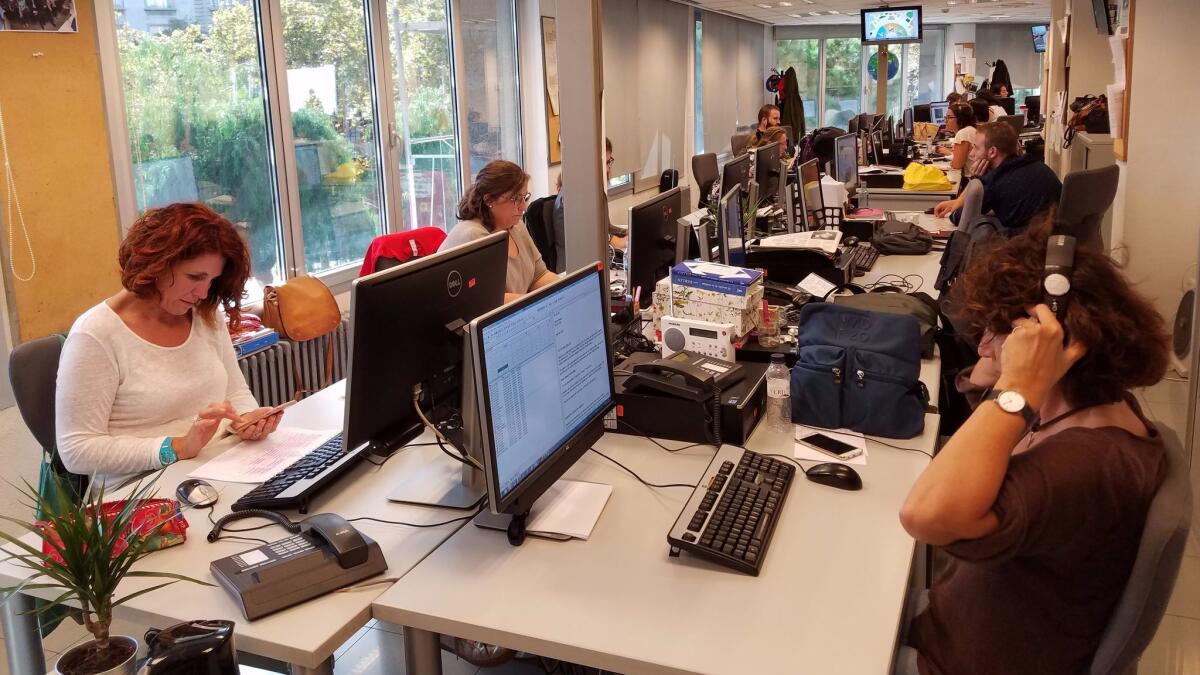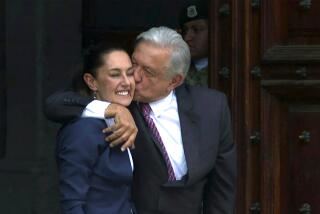Catalunya Radio becomes a flashpoint in the independence movement in Spain

- Share via
Reporting from Barcelona, Spain — Throughout the crisis over the fate of Catalonia, about 600,000 of the 7.5 million people who live there have followed the news in their native language on Catalunya Radio.
Now the hundreds of journalists who work there find themselves in the crosshairs of the northeastern region’s showdown with the central government.
In response to Catalonia’s drive toward independence, Spain’s Senate on Friday is set to approve a plan by Prime Minister Mariano Rajoy to take over the regional government — potentially including the radio station, TV3 and other public media.
Those outlets could be managed by the state to ensure that reporting is “truthful, objective and balanced,” Rajoy said Saturday in announcing his plan.
The reporters at Catalunya Radio, which has been providing round-the-clock coverage of the deepening battle over independence, took deep offense.
“We give voice to everybody,” said 53-year-old Quim Balaguer, who has worked at the station for three decades. “We work with objectivity, freedom and veracity. We disagree totally with the statement of the Spanish government.”
Fellow reporter Marc Garriga, 45, who serves on a five-member elected ethics committee with him, said: “We are not liars. We are not a propaganda machine. We need to preserve our liberty.”
Helping fuel the central government’s charge of bias is the relationship between Catalan regional President Carles Puigdemont and the station director, Saul Gordillo. Before Puigdemont became a politician, the two worked together at a local newspaper and founded a website together. Puigdemont’s government appointed Gordillo last year.
Despite those ties, Gordillo said that Catalunya Radio is objective.
“I’m not a politician,” he said in his office overlooking Avinguda Diagonal, a historic thoroughfare that bisects Barcelona, where the station is headquartered. “I don’t tell any reporters to censor themselves.”
He said that if the central government tries to replace him, he will resist. “I will leave. Sure. In handcuffs with the police beating me.”
Roughly 900 journalists from the station, TV3 and the ACN news agency issued a statement Monday opposing any takeover by the central government. They appeared on television in red T-shirts featuring the station logos and a message: “Without public media there is no democracy.”
“The intervention into TV3 and Catalunya Radio is also a violation of the right to information, a basic pillar of democracy, since these media are unambiguous, informative reference points for Catalan society,” the statement said.
The Catalonia Journalists Assn., which has a membership of 4,000, also condemned the government’s threat, as did Spanish journalists unions, the European Federation of Journalists and state television reporters at the Spanish Radio and Television Corp.
The central government has yet to respond.
Catalunya Radio’s staff members vowed that if the central government removes Gordillo, they won’t recognize his replacement.
“Do they think 400 journalists are going to change their style of working?” Gordillo said.
He said that a takeover would backfire, and that if the government disconnects the broadcast tower the station shares with TV3, “reporters could still do TV and radio on the internet.”
He described the last couple of months as an “emotional roller coaster” for his staff, starting with the Aug. 17 terrorist attack in Barcelona that killed 14 and injured 130.
Then came political protests leading up to an Oct. 1 referendum on secession, which passed with an overwhelming majority of the vote, though turnout was low. The central government, backed by court rulings, declared the referendum illegal as federal police cracked down on protesters. That only invigorated the push for independence.
The prime minister’s plan to suspend Catalan autonomy relies on Article 155, a provision of the 1978 constitution that allows the central government to intervene when an autonomous government “fails to fulfill the obligations imposed upon it by the constitution or other laws, or acts in a way seriously prejudicing the general interests of Spain.”
Catalonia’s parliament is scheduled to meet Thursday — ahead of the Senate vote Friday — and is expected to mount a legal challenge to prevent the central government from taking over, a regional spokesman said Tuesday.
Appeals will be lodged in Spain’s Constitutional and Supreme courts, and if those fail, in international courts, said spokesman Jordi Turull.
Puigdemont could also call an early regional election to avoid a takeover by the central government. A spokesman for his office, Joan Maria Pique, would not say what steps Puigdemont planned to take, but insisted the Oct. 1 vote gave the government a “mandate” to declare independence if it chose to do so.
As for the fate of the region’s journalists, Gordillo said the situation reminded him of the dictatorship of Francisco Franco, who died eight years before Catalunya Radio was founded in 1983.
Gordillo, who grew up during Franco’s repressive reign of nearly 40 years, recalled how Catalan writers forced into exile continued to write from France, Mexico and the U.S.
“Now we are in exile in Spain,” he said. “It’s exciting because every day there are new developments, but you fear Madrid because of what happened under Franco.”
Twitter: @mollyhf
More to Read
Sign up for Essential California
The most important California stories and recommendations in your inbox every morning.
You may occasionally receive promotional content from the Los Angeles Times.











